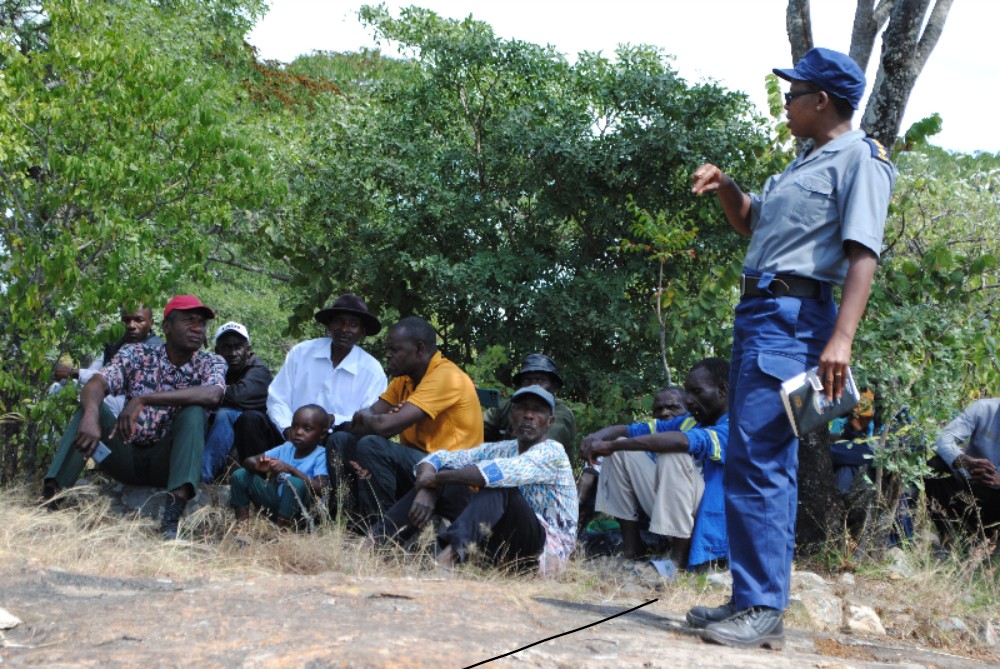Shurugwi Police NWC members accused of corruption, abuse
By Dumisani Ndlovu
SHURUGWI- The concept of community policing, designed to foster trust and collaboration between law enforcement and residents, is under severe scrutiny in the Dorset resettlement area of Ward 21, Shurugwi.
Residents are leveling serious allegations against members of the Neighborhood Watch Committee (NWC), a group affiliated with the Dorset Police Base, accusing them of taking the law into their own hands and engaging in acts of corruption, bribery, and intimidation.
The outcry reached a boiling point, leading to a fact-finding meeting held on April 5th at the local ward centre. Officer-In-Charge (OIC) Chief Inspector Hazvineyi Jindu and an investigative team from ZRP Shurugwi were present, facing a concerned and irate community demanding accountability. This meeting was convened in response to mounting complaints about the NWC’s alleged misconduct.
Leonard Sibanda, a resident who acknowledged a past history of criminal activity, addressed the OIC directly. “It pains me to see officers being led astray by Neighborhood Watch Committee members,” he stated, emphasizing the need for integrity within the local policing structure. Sibanda, claiming to be a reformed individual, urged the police to “stem out such bad elements within the police force.”
Echoing Sibanda’s concerns, Tafara Mubereki questioned the level of training provided to NWC members. He raised critical concerns about the potential dangers of entrusting law enforcement duties to individuals who may lack the necessary understanding of legal procedures and human rights. “They treat suspects as criminals, beating them along the way and demanding bribes,” Mubereki alleged. “Some of them do not respect elderly people and treat old persons as their children.”
These are damning accusations that paint a disturbing picture of a community held hostage by those purportedly meant to protect them. Experts warn that such unchecked power can easily lead to abuse, undermining the very foundation of justice and eroding public trust in law enforcement.
“Community policing is built on the principle of mutual respect and cooperation,” says Dr. Aisha Bello, a criminologist specializing in community policing models. “When these committees are not properly vetted, trained, and supervised, they can quickly become instruments of oppression, particularly in vulnerable communities. The lack of accountability creates a breeding ground for corruption and abuse of power.”
The allegations of bribery and assault are particularly alarming. They suggest a systematic exploitation of the community by individuals leveraging their positions within the NWC for personal gain. The reported disrespect and mistreatment of elderly residents further underscores a breakdown of societal norms and a disregard for fundamental human rights.
Chief Inspector Jindu has assured the community that these allegations will be thoroughly investigated. She stressed the importance of community collaboration in maintaining law and order but made it clear that any abuse of power would not be tolerated. Jindu also stated that, should the investigations prove the accusations to be true, the implicated NWC members would be relieved of their duties.
While the police investigation is underway, the situation in Dorset highlights the critical need for robust oversight and accountability mechanisms within community policing initiatives. Adequate training, regular performance reviews, and clear channels for reporting misconduct are essential to prevent abuse and ensure that these committees serve their intended purpose: to protect and serve the community, not to exploit and intimidate it.
Tendai Mubereki from village 2 Asvoldraai farm populary known as Penny area said the situation in Dorset community policing need serious intervention and investigation.
“While potentially beneficial community policing, requires careful implementation and constant vigilance to prevent it from becoming a tool of oppression rather than a force for good,” she said.
The Ministry of Home Affairs and Cultural Heritage, particularly the Zimbabwe Republic Police (ZRP), should ensure transparency and accountability in this case. The future of community policing initiatives in Zimbabwe hinges on the ministry’s commitment to upholding the principles of accountability and transparency.

